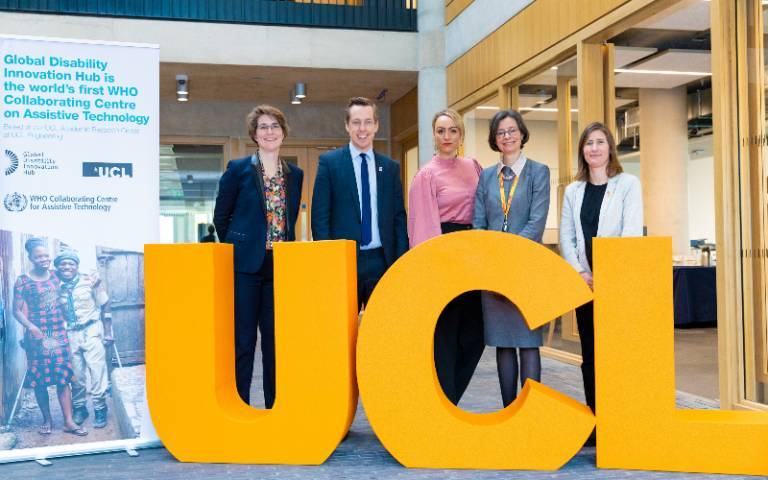UK Government awards £31m to UCL’s Global Disability Innovation Hub
15 June 2023
A UK government body has announced further investment into assistive technology projects at UCL’s Global Disability Innovation Hub, to support millions more people with life-changing accessible technology.

The £31 million for the UCL-led AT2030 programme comes from UK Aid, a funding programme that is part of the UK’s Foreign, Commonwealth & Development Office, which helps to tackle the global challenges of our time. AT2030 is part of UCL’s Global Disability Innovation Hub (GDI Hub), based at the new UCL East campus on Queen Elizabeth Olympic Park in Stratford, East London.
The additional funding will allow the programme to continue to support governments in developing their policy and practice frameworks, ensure the physical and digital environments are accessible for assistive technology (AT) users, and trial a scaled version of innovation support. AT2030 will also be developing tools which make better use of data, building on the strengths of UCL Computer Science in Human-Computer Interaction and AI, working with partners to develop tools to allow for more affordable and informative data sets for the second Global Report on AT.
UCL President & Provost, Dr Michael Spence, said: “The Global Disability Innovation Hub is an immensely valuable part of UCL, enabling us to use our institutional strengths in technology, innovation, design and social research, while working alongside partners in London and across the globe, to improve health outcomes and reduce inequalities. It is excellent news that the GDI Hub has further support to continue their vital work in improving access to transformative assistive technologies.”
UCL’s GDI Hub began investigating how to improve access to AT following the 2018 Global Disability Summit, held on the site of the Paralympics Games in London. The AT2030 programme1 has enabled researchers, innovators and AT users to experiment with new ideas for getting products – such as eyeglasses, wheelchairs, prosthetics and digital devices – to those that need them most around the world.
Working alongside more than 70 partners in 60 countries, the AT2030 programme has already reached 29 million people so far, accelerating new technologies and service delivery models through a pilot assistive technology impact fund, trialling market shaping techniques that have worked in other sectors, developing new tools and training to support governments to build capacity to delivery AT, and building community-led innovation.
While the demand for assistive products is vast, markets are just beginning to emerge and UK Aid is funding AT2030 to continue to trial innovative models to kickstart access. With recent global commitments on AT, some products are beginning to scale, and prices in some sectors are starting to drop.
UK Minister of State for Disabled People, Health and Work Tom Pursglove MP, made the announcement at the UN Disability Conference at the United Nations in New York. He said: “We know that as a global ageing population, the need for ATech is growing; and so must our efforts. If we are lucky enough to grow old, all of us will need ATech at some point in our lifetimes.
“This investment will redouble our efforts on Inclusive Innovation and ATech access as we approach the last six years of the UN Sustainable Development Goals.”
The Global Report on AT, co-sponsored by AT2030 and published by WHO and UNICEF last year, found that 2.5 billion people require one or more assistive products, and this is expected to grow to over 3.5 billion by 2050 as the global population ages.
Dr Vicki Austin, Director & Co-founder of the Global Disability Innovation Hub at UCL, said: “Over the past five years we’ve seen assistive technology emerge onto the development agenda as a key priority for anyone who believes in inclusion, economic wellbeing, and societies where all can participate. Since the pandemic, the need is even greater and the opportunities more exciting too, as digital solutions are powering rapid change.
“I am proud that GDI Hub, born of the legacy of the London 2012 Games, contributes to lead the global agenda on disability inclusion, and to do this from our new home at UCL East. From our students, our researchers and our team, to our corporate partners, the communities we work with and the creative innovators we work with – everyone is determined to match this funding 100% and meet the challenge of inclusive tech for all.”
The world’s first WHO Global Collaborating Centre on Assistive Technology, GDI Hub’s academic research centre is based in UCL Computer Science within the Faculty of Engineering.
Professor Paola Lettieri, Pro-Provost of UCL East, said: “The Global Disability Innovation Hub embodies UCL East’s mission to create innovative solutions to global challenges, with inclusion and equality at the heart of this work. I’m delighted that its success in bringing assistive technology to those who need it has been recognised with additional funding from the UK government.”
Links
- UCL President & Provost, Dr Michael Spence
- Dr Vicki Austin, co-founder of GDI Hub
- Pro-Provost of UCL East, Professor Paola Lettieri
- Global Disability Innovation Hub
- UCL Computer Science
- UCL Faculty of Engineering
Image
- Image taken at the official opening of GDI Hub in 2022, Tom Pursglove MP with leaders from UCL East and GDI Hub
Media contact
Dr Matt Midgley
E: m.midgley [at] ucl.ac.uk
 Close
Close

